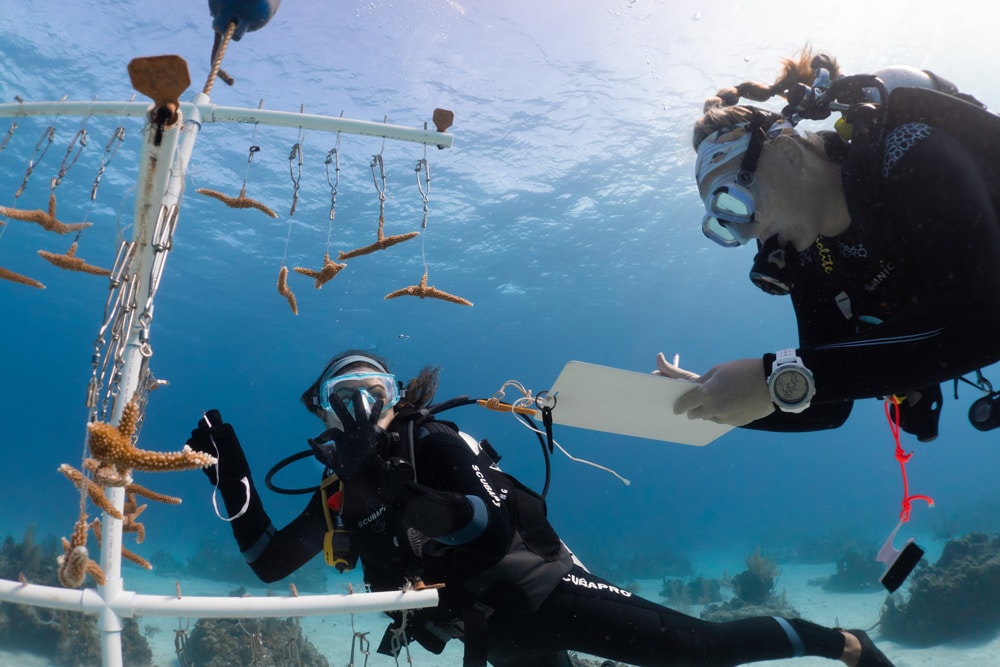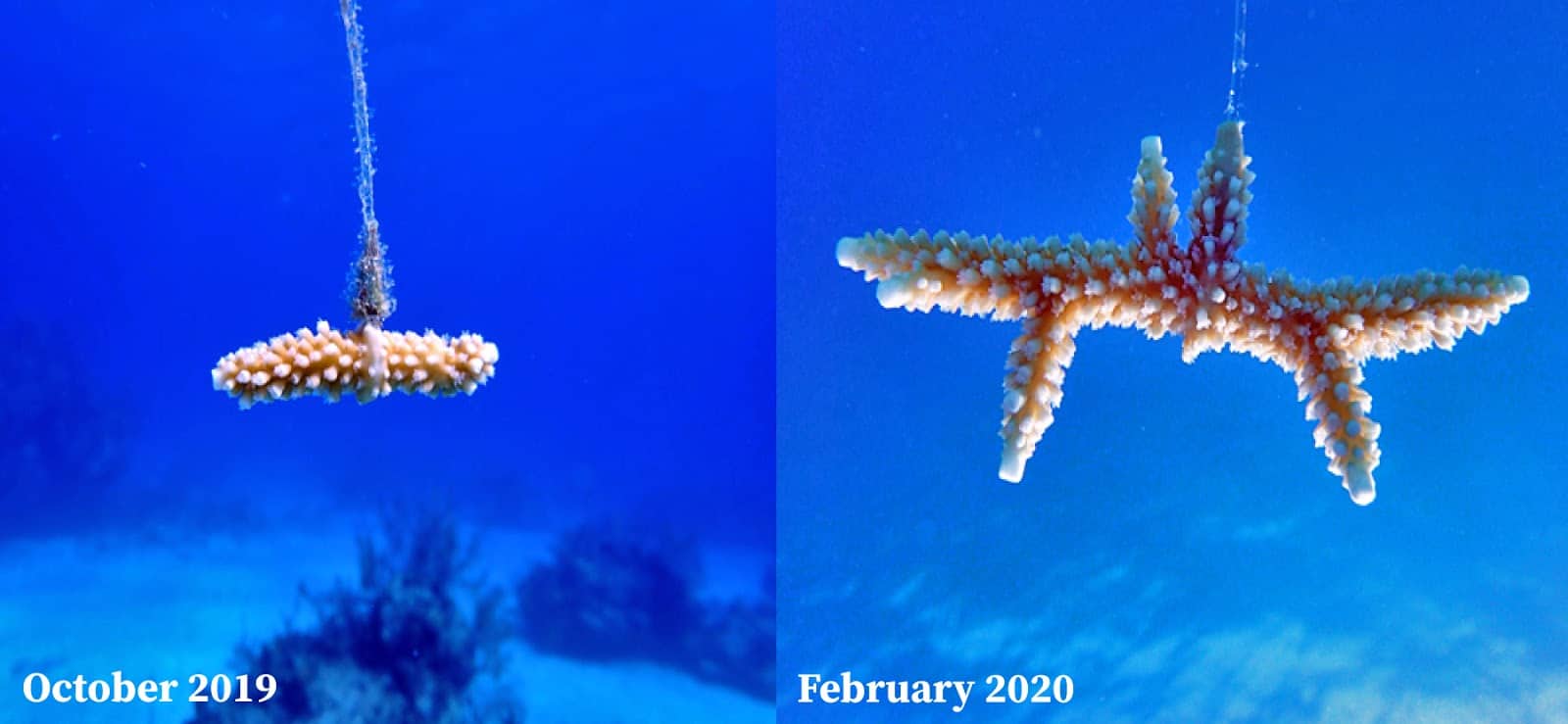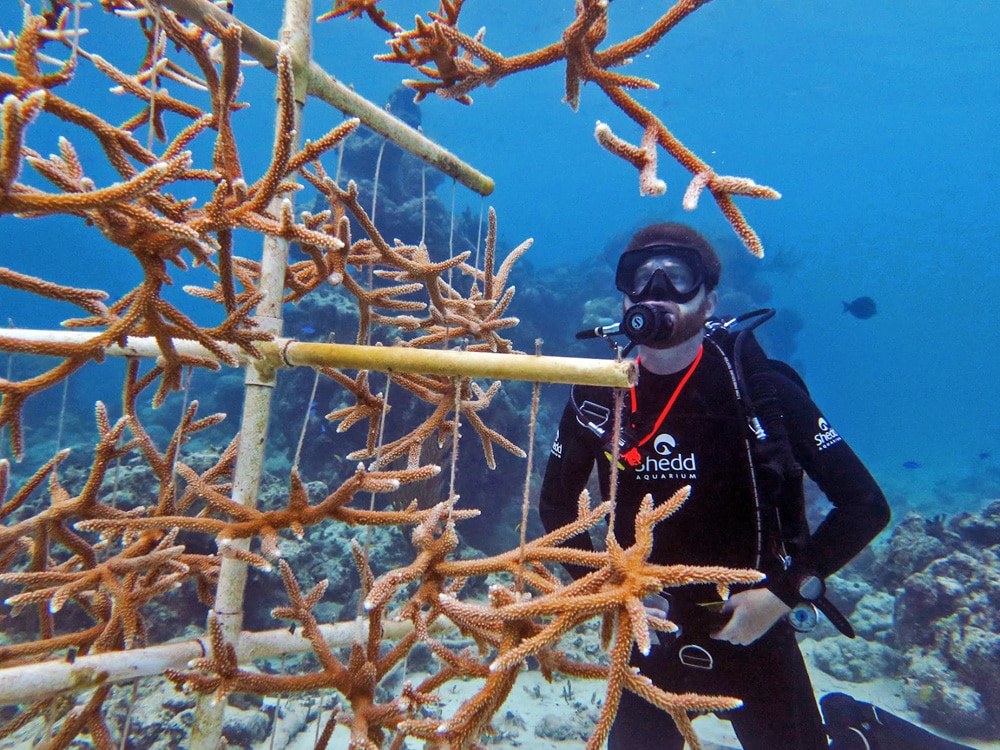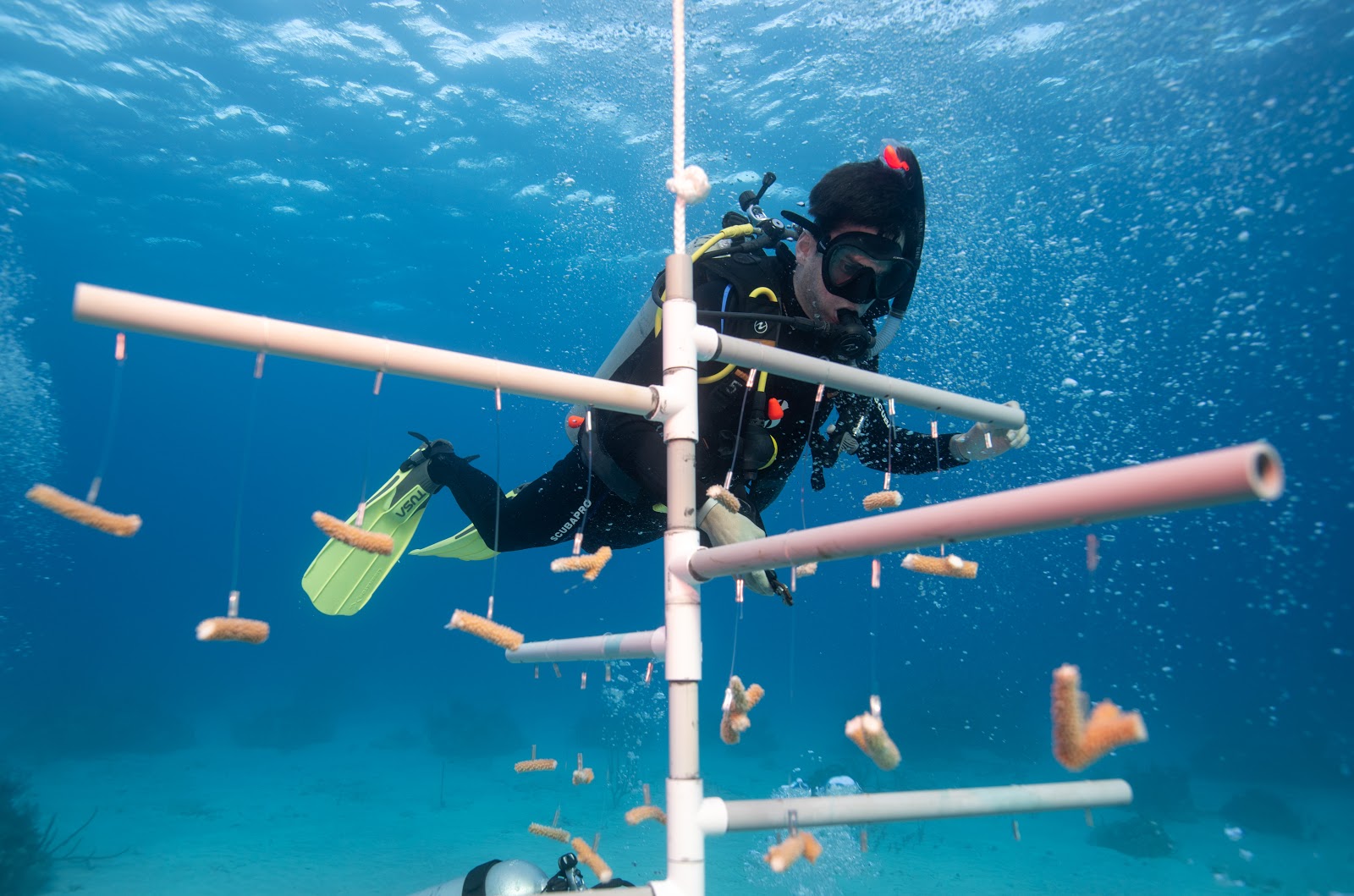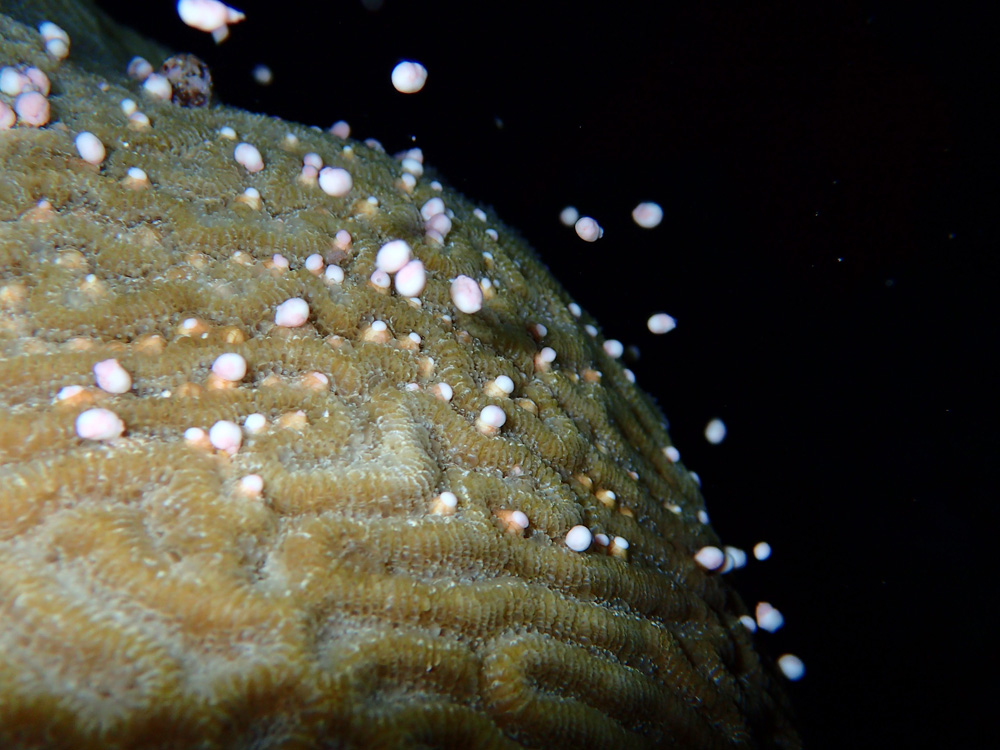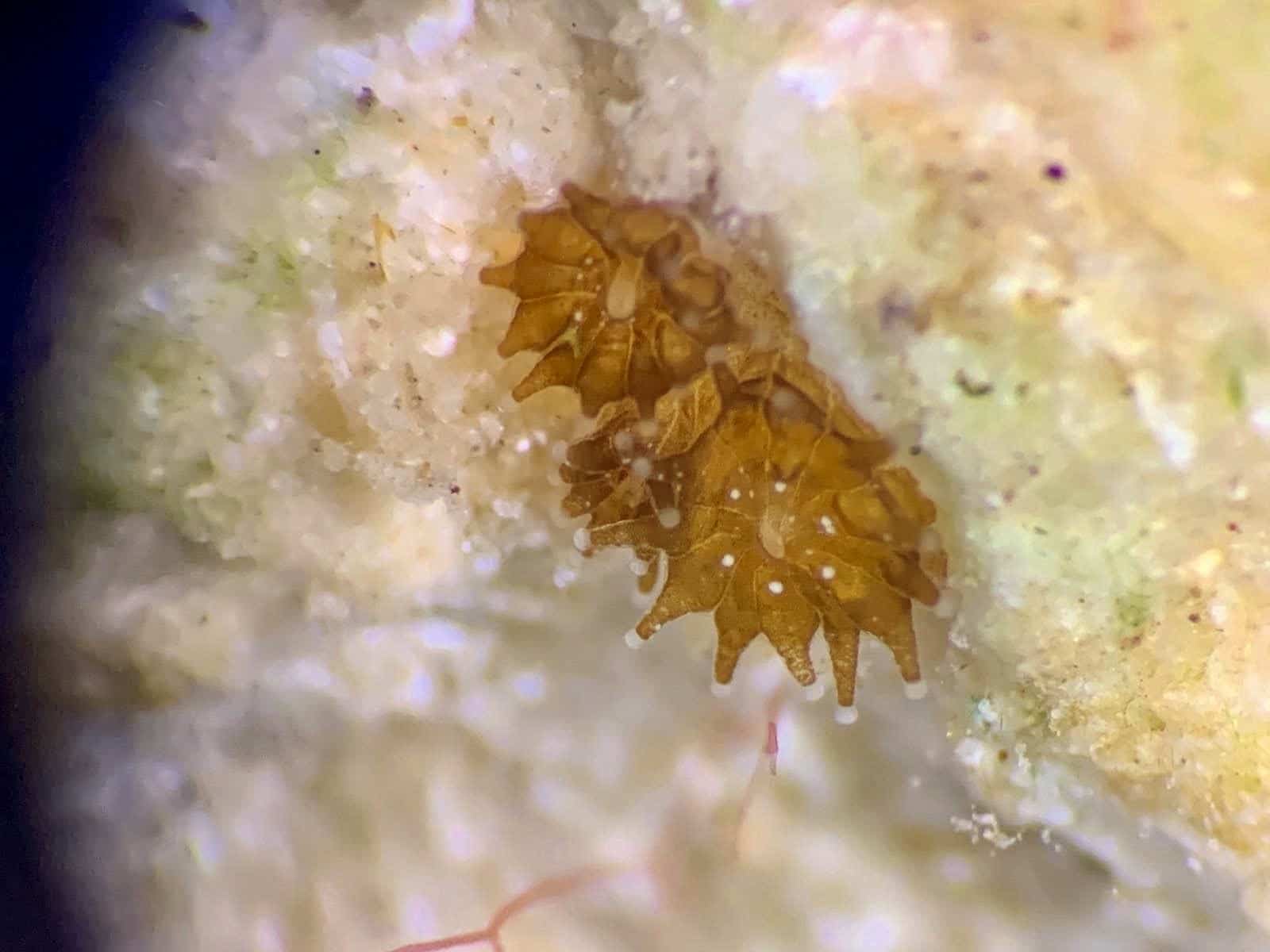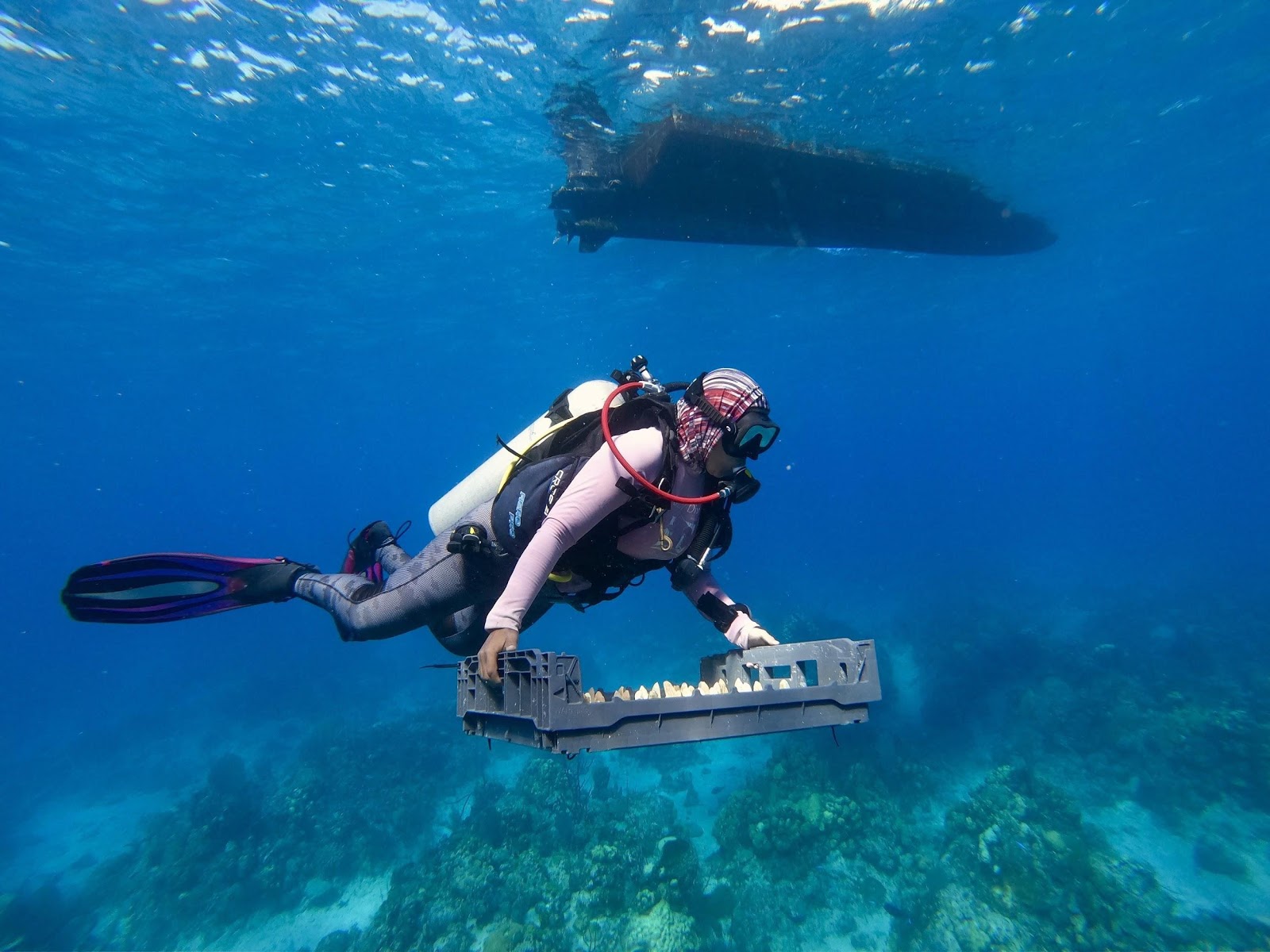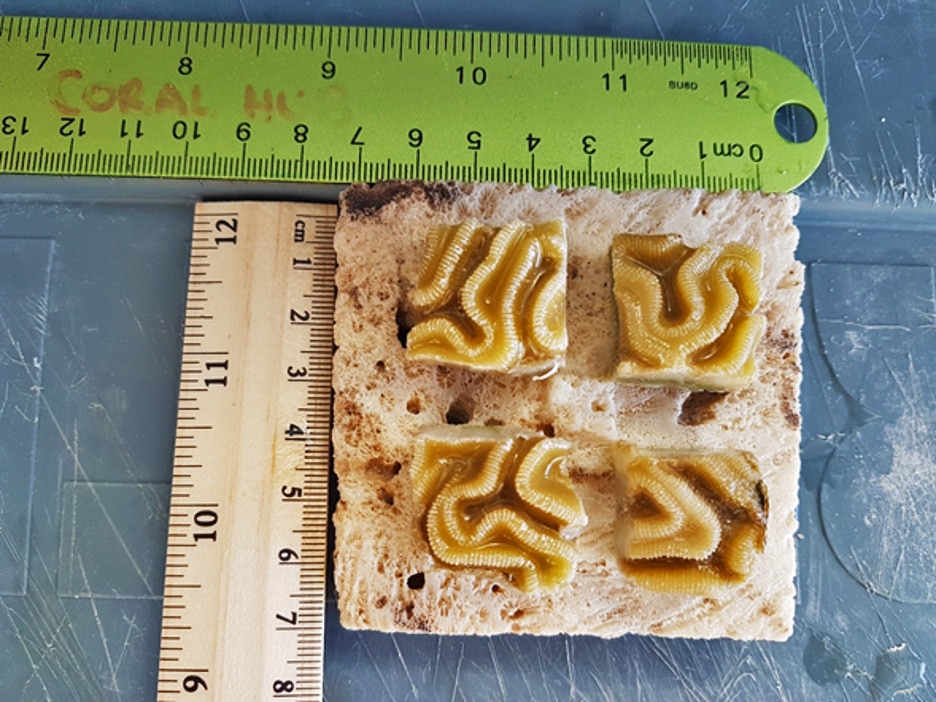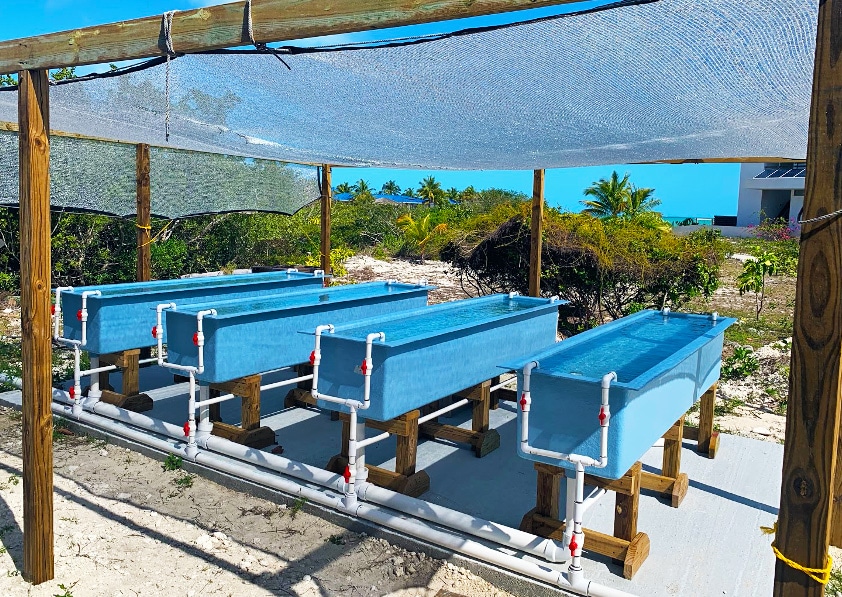Marine Life & Conservation
Reversing the decline of Bahamian reefs
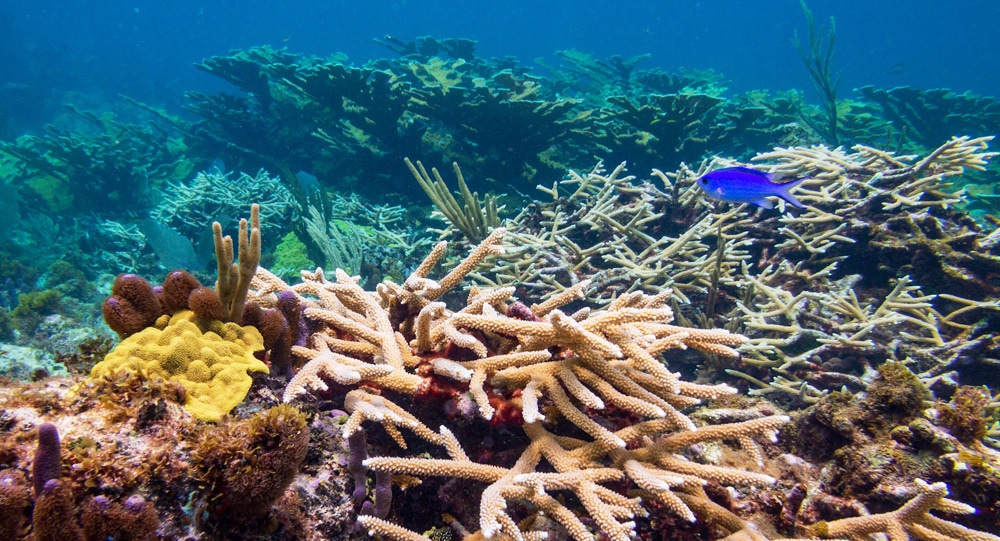
I recently got in touch with the Cape Eleuthera Institute in The Bahamas to ask about their work on coral reef conservation. I was delighted to “meet” Natalia Hurtado, MSc., Coral Reef Research Associate at PIMS/CEI & Casey Harris, MSc., Coral Reef Research Associate at PIMS/CEI. THis is what they had to say about their important work.
Much like coral reefs worldwide, coral populations in The Bahamas are declining at alarming rates, making coral restoration more vital to preserve marine resources and local economies. The Bahamas Coral Innovation Hub located in Eleuthera, The Bahamas is a collaboration between the Cape Eleuthera Institute (CEI), Perry Institute for Marine Science (PIMS), and The Nature Conservancy (TNC). With our work, we hope to facilitate the recovery of degraded Bahamian reefs and enhance coral population resilience.
One major problem facing coral reefs worldwide is that coral abundance is decreasing due to both local and global threats, making it difficult for corals to maintain genetic diversity on the reef. At the same time, their ecosystem services are deteriorating, affecting human livelihoods and the diversity of marine species that rely on them. At the Coral Innovation Hub, we focus our restoration efforts on 3 main areas of research: nursery-reared coral fragments, larval propagation, and coral microfragmentation. We are also dedicated to student involvement in our research, with the goal of inspiring younger generations to pursue careers in marine conservation. All projects at the Coral Innovation Hub are led by Natalia and Casey.
Nursery Establishment to Improve Genetic Diversity
Corals can reproduce asexually, in which they undergo a strategic life-history trait called “fragmentation”, where pieces of coral can break off from disturbance and then attach to the substrate to form a whole new colony. We can take advantage of this natural process to grow corals at a much faster rate and plant them back on degraded reefs. We do this by growing corals in a mid-water tree structure, which is made with PVC and tethered to the sea floor, where corals are suspended away from sediment and predators. Below is a picture of Researcher Casey Harris taking notes of coral sizes while an assistant is taking measurements.
The establishment of coral nurseries is an important step to keep coral fragments safe while they grow. Caribbean branching corals grow extremely fast and increase in size about 10-20 cm (4-9 in) per year compared to large boulder species, which only grow about 1-2 cm (<1 in) per year. This is great for restoration efforts because after one year of growing in the nursery, branching corals can be outplanted back on the reef.
We are currently running a project with Dr. Ross Cunning (pictured below) at Shedd aquarium and the Reef Rescue Network, where we are investigating the resilience of staghorn corals by spreading different genotypes across The Bahamas to increase genetic diversity within coral nurseries. We have 19 staghorn genotypes that were collected and moved between existing nurseries and wild populations throughout a few Bahamian Islands in October 2019. Increasing genetic diversity within coral nursery projects is important because some genetically distinct individuals may be better suited to withstand environmental stress than others. Having as many different genotypes as possible is essential to successful restoration outcomes.
During a 15-day expedition onboard the Shedd Aquarium research vessel R/V Coral Reef II, 570 staghorn corals were distributed between newly established nurseries located in Bimini, Nassau, Cat Island, and Eleuthera. In each location, coral growth has been monitored by our partners and they are thriving in their new locations.
Student Involvement as Reef Rescue Divers
The Coral Innovation Hub at CEI works closely with Island School students and visiting educational groups from different ages and backgrounds. These students have a unique opportunity to complete a PADI Reef Rescue Diver Specialty Course. This course was developed by Hayley-Jo Carr, Training Director & Coordinator of the Reef Rescue Network, and Dr. Craig Dahlgren, Executive Director of PIMS. The Reef Rescue Diver Specialty and Reef Rescue Network were both created by PIMS, with the goal of rehabilitating coral reefs by working with various partners to establish a network of coral nurseries around The Bahamas and other parts of the Caribbean.
During the course, students learn about the value of coral reefs and restoration, different types of nurseries, how to maintain nurseries, coral fragmentation, outplanting and monitoring. They work with Critically Endangered species, such as elkhorn and staghorn coral, that were once abundant on Caribbean reefs but have rapidly declined since the 1980s. We target these species for restoration because they play an important ecological role on the reef by providing high rugosity and three-dimensional functionality that protects our shorelines and provides shelter for marine life.
Implementing Larval Propagation as a Restoration Technique
Corals can also reproduce sexually. In sexual reproduction, corals release “spawn” (egg and sperm) and can synchronize their spawning events with colonies of the same species. Pictured below are the gamete bundles of a brain coral, in which the coral releases both egg and sperm (male and female gametes). We can take advantage of these spawning events to collect their spawn and cross fertilize them to increase genetic diversity, and study the vulnerable early life-history stages of corals.
During summer 2019, Coral Innovation Hub researchers collected coral gametes and saw high rates of fertilization and settlement success, with over 5,000 Orbicella faveolata (mountainous star coral) recruits (coral babies pictured below) settled on SECORE Seeding Units (concrete and ceramic substrates).
We are allowing juvenile corals to grow in an offshore nursery tree and outplanted more than 1,000 substrates with coral recruits onto the reef. The goal is to determine if initial and long-term coral survivorship is possible in an offshore nursery and/or on the reef. This research was conducted during SECORE’s International Coral Spawning and Propagation Workshop hosted at CEI with PIMS and TNC. Below is a picture of Researcher Natalia Hurtado carrying substrates to be outplanted on the reef.
A New Restoration Technique for Boulder Corals
Another way to grow corals through asexual reproduction is by using a new restoration technique for slow-growing boulder species called “microfragmentation,” founded by Dr. David Vaughan, Plant a Million Corals. This process consists of cutting fragments of the same colony into small pieces (1-3 cm, pictured below), using a specialized saw. The clone fragments will recognize each other and fuse together, growing 25-50 times faster than normal.
At the Coral Innovation Hub, we plan to run pilot experiments on different coral species to document the most successful microfragmentation methods needed to upscale our efforts. As part of our study, we will examine the survivorship and growth of microfragmented boulder corals (brain corals, star corals, etc.) in our land-based wetlab facility (pictured below). If proven successful, we will grow boulder corals in an offshore table nursery or directly outplant microfragments to the reef.
Want to know more about Reef Rescue Network? Please contact Hayley-Jo Carr. If you have any questions or want to get involved with The Bahamas Coral Innovation Hub project, please contact Natalia Hurtado or Casey Harris.
Marine Life & Conservation
Paul Watson Released as Denmark Blocks Japan’s Extradition Bid

Renowned anti-whaling activist Paul Watson has been released from custody in Greenland after spending five months in detention. Denmark’s Justice Ministry rejected Japan’s request for his extradition, citing insufficient guarantees that his time already served in custody would be credited against any potential sentence.
The 74-year-old Canadian-American was arrested on July 21 in Nuuk, Greenland’s capital, when his ship docked to refuel. His arrest was based on a 2012 Japanese warrant related to a 2010 encounter in Antarctic waters. Japan alleged Watson obstructed operations and caused damage to a whaling research ship during efforts to disrupt illegal whaling. Watson has consistently denied these claims, maintaining his commitment to marine conservation.
Denmark, which oversees extradition matters for Greenland, concluded that while the legal conditions for extradition were met, the lack of assurances from Japan regarding time-served credit made extradition untenable.
In a video shared by his foundation, Watson expressed gratitude and relief, saying, “After five months, it’s good to be out… and good to know they’re not sending me to Japan.” He added that the most difficult part of his time in custody was being separated from his two young sons.
Watson is a pioneering figure in marine conservation, known for founding the Captain Paul Watson Foundation in 2022 after decades of activism with the Sea Shepherd Conservation Society. His bold efforts to defend marine life have earned him widespread support, including from celebrities and conservationists. His work has also been featured in the acclaimed reality TV series Whale Wars.
Watson’s lawyer, Jonas Christoffersen, praised the decision, stating, “We are happy and relieved that Paul Watson is now free.” He added that Watson is eager to reunite with his family and continue his vital work.
The arrest occurred while Watson’s vessel, the M/Y John Paul DeJoria, was en route to the North Pacific with a team of 26 volunteers to intercept a Japanese whaling ship. His foundation described the arrest as politically motivated and emphasized that Watson’s actions were focused on ending illegal whaling practices.
Japan resumed commercial whaling in 2019 after leaving the International Whaling Commission, asserting that whale meat is a cultural tradition. Conservationists, however, continue to challenge these practices, highlighting their impact on marine ecosystems.
Despite the challenges, Watson remains steadfast in his mission to protect marine life and bring attention to whaling practices. His dedication to ocean conservation has made him a globally respected advocate for the environment.
Marine Life & Conservation
12 Days of Zero-Waste Fish-mas

This holiday period, the Marine Conservation Society, the UK’s leading ocean membership charity, invites you to make some simple changes to eating fish this Christmas to help our seas.
Dr Kenneth Bodles, Head of Fisheries and Aquaculture at the Marine Conservation Society, said, “During the festive season, our consumption increases, but so does waste. Sustainability isn’t just about where food comes from – it’s also about how you use it. By reducing waste and making the most out of your seafood, you’re not only taking steps to be more ocean-friendly, but can also help to cut costs during what is often one of the most expensive times of the year”.
The Marine Conservation Society has compiled twelve tips on how to consume seafood sustainably with zero-waste this Christmas:
Buy whole fish instead of fillets
Instead of fillets, consider buying whole fish such as salmon, hake, or lemon sole. By adopting a “nose to tail” approach with cooking, whole-baked fish not only feeds a crowd, but also helps to minimise waste and maximise sustainability by using up every part of the animal, including bones, skin, and fat.
Make fish stock
Leftover fish bones or shells can be put to good use by boiling them to make a nourishing fish stock or bisque. This can be frozen and preserved for later use and makes for a flavourful base in a soup.
Make your own fish pâté
Avoid waste by turning leftover fish, such as smoked mackerel or salmon, into a delicious pâté by blending with cream cheese and lemon. Perfect when paired with crackers.
The sustainability of salmon and mackerel varies depending on where and how it is caught or farmed. For more information on green-rated options, check the charity’s Good Fish Guide.
Buy frozen
By purchasing seafood that is frozen or vacuum-packed, this helps to reduce waste by extending the shelf life of your food.
Fish pie
If you’re wondering what to do with leftover cooked fish, why not opt for a classic fish pie with mashed potatoes, leeks, and a cheesy sauce? A sure crowd pleaser on Boxing Day.
Use the head
Don’t forget the fish head! The meat is incredibly tender and flavourful. The charity recommends a cod’s head curry or recreating Fallow’s renowned cod’s head in siracha butter.
By stretching your ingredients further, not only is this a more sustainable way to enjoy seafood, but also cost-effective by repurposing leftovers and cooking creatively.
Boxing Day brunch
Mix leftover kippers or smoked salmon with scrambled eggs for a tasty, zero-waste, Boxing Day brunch.
For best choice, make sure you buy kippers, or herring, from the North Sea and the North Irish Sea.
Zero-waste storage
A top tip from the Marine Conservation Society to avoid waste is freezing fish offcuts to save for future use.
Crisp up the skin
Even leftover fish skin can be turned into a quick savoury snack by crisping it up in an air fryer with a little olive oil and salt.
Anchovies two ways
Leftover anchovies can either be blended with butter to make a delicious anchovy butter or tossed into pasta for a hit of umami flavour.
The charity recommends opting for anchovies caught in the Bay of Biscay for best choice.
Fishcakes
For an easy, zero-waste meal, leftover seafood trimmings can be mixed with mash and fried in breadcrumbs to make fishcakes.
Pickled mussels
Try pickling mussels in 1:1 vinegar and water, with a dash of sugar for a sustainable, zero-waste snack that can be enjoyed well beyond the festive season.
Mussels farmed in the UK are a seafood superhero. Grown using low-impact methods and harvested by hand, they get all the food they need from the sea around them. This makes them one of the most sustainable, ocean-friendly, and cost-effective seafood options.
Players of People’s Postcode Lottery have raised £6.6M towards the Marine Conservation Society’s vital work in making seafood more sustainable.
Laura Chow, Head of Charities at People’s Postcode Lottery, said: “Fish is a festive favourite for many, but making sustainable choices when it comes to how we buy and eat seafood makes all the difference for our ocean. Support from players of People’s Postcode Lottery has helped the Marine Conservation Society further its sustainable seafood work, so that we can all enjoy healthier, better protected seas.”
The Marine Conservation Society encourages you to make sustainable seafood choices a year-round habit, not just for Christmas. To check how sustainable the seafood on your plate is, you can visit the charity’s Good Fish Guide. The Guide helps consumers and businesses identify the most sustainable seafood using a simple traffic light system, based on where and how species are caught or farmed. Green is the best choice, amber means improvements are needed, and red indicates fish to avoid buying.
Zero-waste gift idea
Why not embrace a zero-waste Christmas by gifting a membership to support marine conservation? It’s a meaningful, low-waste gift that helps protect our ocean for generations to come. Memberships start from as little as £5 a month – the price of a sandwich and drink from your local coffee shop.
Find the latest sustainable seafood advice for wild-caught and farmed seafood on the Good Fish Guide, downloadable to your phone from www.mcsuk.org/goodfishguide.
-

 News2 months ago
News2 months agoIconic SS United States to become the World’s Largest Artificial Reef
-

 News3 months ago
News3 months agoBook Review – 52 Assignments: Underwater Photography
-

 Gear News3 months ago
Gear News3 months agoDYNAMICNORD – New German diving brand enters the British market
-

 News3 months ago
News3 months agoExploring Cenote El Pit: A Diver’s Dream
-

 Gear News3 months ago
Gear News3 months agoTry BARE drysuits (and maybe even win one!) this Friday with Sea & Sea at North West Dive Fest
-

 Marine Life & Conservation3 months ago
Marine Life & Conservation3 months agoBook Review: Coral Triangle Cameos
-

 Blogs2 months ago
Blogs2 months agoDive the Egyptian Red Sea this Autumn with Regaldive
-

 News3 months ago
News3 months ago2024 Ocean Art Underwater Photo Competition Announced


